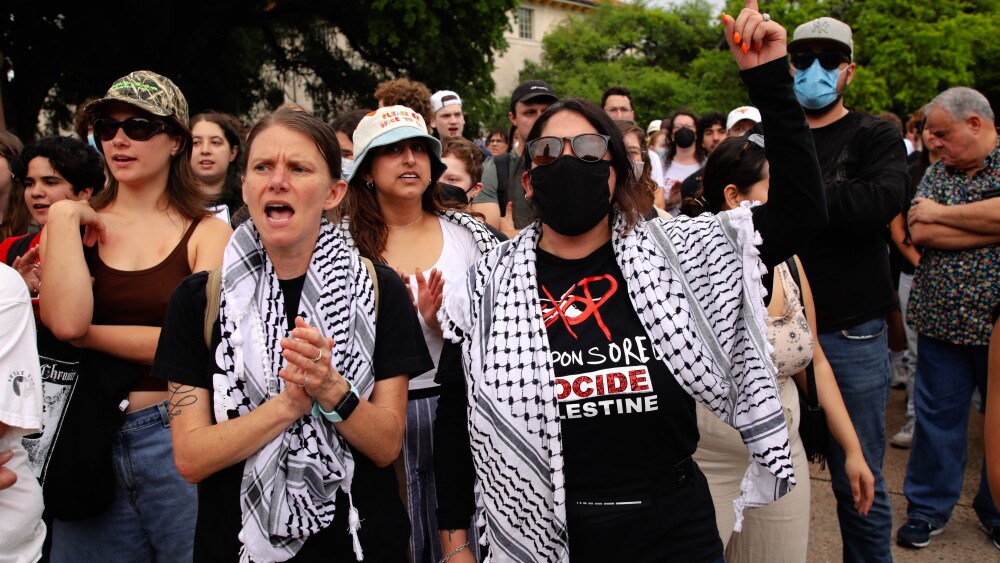At nearly every pro-Palestine rally on college campuses, protestors chant, “From the river to the sea, Palestine will be free.” Many students insist it is just a call for freedom, not a call for violence. They neither hear nor understand what they are saying—that Palestinian liberation requires the elimination of Israel and its nine million citizens. This is not just poor messaging; it is the logical endpoint of an ideology that has captured the minds of a generation, and it reveals something troubling: Young activists have been taught to see Israeli and Palestinian existence as mutually exclusive. In their framework, one people can only thrive if the other is erased. It is the Zero-Sum Trap.
After October 7, 2023, students celebrated Hamas’s massacre as “decolonization in action.”
I recognize such Manichaeism. For sixteen years, I grew up in an ultra-Orthodox community that divided the world into categories: kosher and treif, pure and impure, us and them. There was no middle ground. Binary frameworks do not allow alternatives. This is exactly what happened with campus activism regarding Israel and Palestine. Students have been taught a story with heroes and villains: Palestinians are “colonized indigenous people” fighting for liberation and Israelis are “white European settlers” who stole their land. In this framework, Israel’s existence is the obstacle to Palestinian freedom. Remove Israel, and Palestinians will be free. Simplicity is seduction. It requires no wrestling with complexity, no tolerance for ambiguity, no acknowledgment that two peoples might both have different narratives. The cognitive load is minimal. Just identify the oppressor, support the oppressed, and join the right side of history. Such a thought process is not only oversimplified; it is destructive.
After October 7, 2023, students celebrated Hamas’s massacre as “decolonization in action.” They cheered the murder of civilians at a music festival as “resistance.” They justified the kidnapping of children and elderly Holocaust survivors as “the cost of liberation.” And they did this while genuinely believing they were standing for justice.
How does this happen? It is moral inflation in which rigid ideology makes every action equivalent to the worst possible crime. If Israel sends bombs to Gaza, it is akin to committing genocide, so any action against Israelis becomes justified self-defense. If Israel simply exists, it is a settler-colonial project, so its destruction is not only acceptable but also morally necessary. If being Zionist is akin to racism, then Zionists deserve what they get.
This is the death of proportionality and nuance and leads to the normalization of violence. Psychology teaches that defining a group as the source of injustice is a prerequisite to making their elimination virtuous. The Nazis believed this about Jews. The Khmer Rouge believed this about intellectuals and now, campus activists believe this about Israelis and Zionists.
Ideology this rigid does not survive in diverse intellectual environments; it needs insularity to thrive. American campuses provide that. Over 90 percent of humanities and social sciences professors identify as progressive. Middle East Studies departments are ideologically homogeneous, with scholars who support Israel’s existence excluded. Students for Justice in Palestine does not platform speakers who challenge their narrative. The entire ecosystem reinforces a single interpretation: Israel is evil, Palestinians are victims, and Israel’s elimination is liberation.
Two states can coexist. Israeli security and Palestinian dignity are not mutually exclusive.
When dissent is punished rather than debated, positions do not moderate; they radicalize. Insularity breeds extremism. American campuses today are among the insular intellectual spaces in the Western world. Add to this the human hunger for certainty and belonging. Gen Z is the loneliest generation on record. They crave community, meaning, and purpose. Campus activism offers all three but at the price of uncritical acceptance. To question whether Hamas is a terrorist organization, to suggest that Israelis deserve security too, or to acknowledge Jewish indigenous ties to the land is a recipe for exile.
The students chanting do not understand: Palestinian success does not require Israeli destruction. Zionists and/or Israel have offered Palestinian statehood multiple times—in 1937, 1947, 2000, 2001, and 2008. Each time, Arab or Palestinian leadership rejected it. Israel withdrew entirely from Gaza in 2005, removing every settler and soldier. Rather than building a state, Hamas took over and used it as a launching pad for rockets and terrorism. The obstacle to Palestinian statehood has never been Israel; it is the Palestinian leadership’s refusal to accept that existence.
Two states can coexist. Israeli security and Palestinian dignity are not mutually exclusive. Jewish self-determination and Palestinian self-determination can both be legitimate. The tragedy is that zero-sum framing does not just harm Israelis, it dooms Palestinians. So long as Palestinian movements define success as Israeli elimination, they will never achieve statehood. Their ideology is in dissonance with reality.
To help the next generation escape this trap, intellectual humility must return to campus discourse. Departments can no longer shirk ideological diversity. Faculties must teach students that complexity is not complicity. To double down on the zero-sum game, however, will not be a path to Palestinian freedom but rather to endless war.




